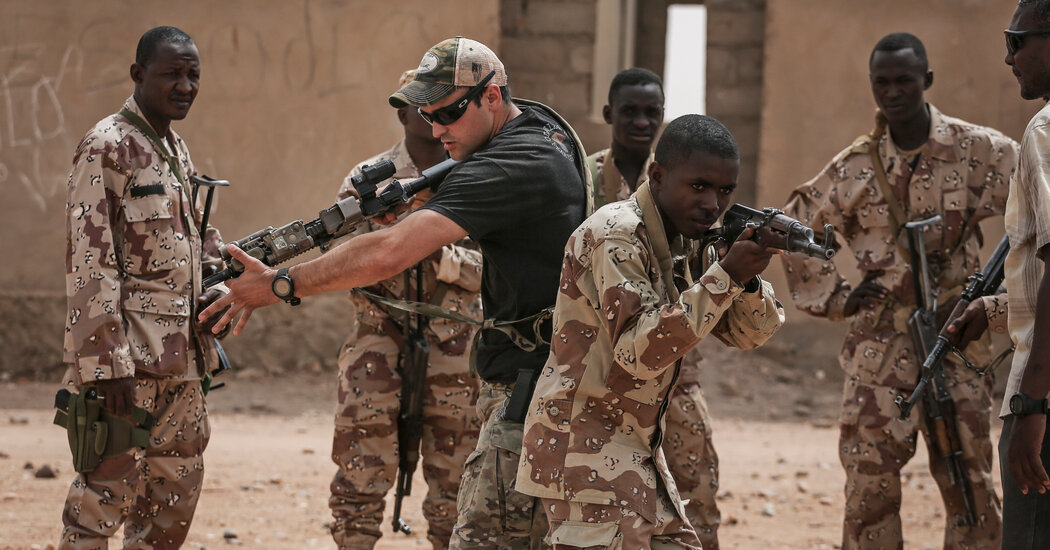The withdrawal of 1,000 U.S. military personnel in Niger is underway, and all American troops will leave the West African country by Sept. 15, the U.S. and Nigerien governments said on Sunday.
The agreement, described in a joint statement by the two countries’ militaries, spells out the terms of the pullout that the Biden administration announced last month. It also signifies the beginning of the end of the Pentagon’s most enduring counterterrorism partnership in the tumultuous Sahel region of Africa.
A senior Pentagon official, Christopher P. Maier, and a top U.S. officer, Lt. Gen. Dagvin R.M. Anderson, met in Niamey, Niger’s capital, this past week with representatives of Niger’s military, led by the army chief of staff, Col. Maj. Mamane Sani Kiaou, the statement said. The meeting was meant “to coordinate the orderly and safe withdrawal of U.S. forces from Niger,” it added.
The statement, released by the Pentagon, also said the two militaries had established procedures to ease the entry and the exit of U.S. personnel, including flight and landing clearances for military planes. Niger has balked at approving some of those clearances in recent months, American officials said.
In a separate statement posted on social media, Niger’s military said that “the withdrawal of American forces from Niger will be carried out with mutual respect and transparency by mid-September 2024.”
The date was in line with what American officials had been expecting, but became official after the meetings last week. About 100 American personnel with pressing medical needs or family obligations, or whose jobs had been made obsolete by the earlier decision to withdraw, have left on commercial flights in the past week, Kelly Cahalan, a spokeswoman for the military’s Africa Command in Stuttgart, Germany, said on Sunday.
In a conference call with reporters on Sunday afternoon, a senior Defense Department official said that U.S. forces would take with them all lethal or hazardous weapons or equipment, but that other things like housing, generators and air-conditioners would be left behind for the Nigeriens to use.
U.S. relations with Niger have steadily worsened since the military ousted the country’s president, Mohamed Bazoum, last July. The Biden administration waited until October to formally declare the junta’s takeover a coup, hoping to resolve the crisis and avoid a congressional mandate to halt economic and military aid to any government deemed to have been installed by a military coup until democracy is restored.
Diplomatic negotiations went nowhere, however, and the junta said in March that it was ending its military cooperation deal with the United States after a contentious set of meetings in Niamey with a high-level American diplomatic and military delegation. Nigerien leaders accused American officials of telling them how to run their country, an accusation that Biden administration officials rejected.
Niger’s decision was in keeping with a recent pattern by countries in the Sahel region, an arid area south of the Sahara, of breaking ties with Western countries. Increasingly, they are partnering with Russia instead.
In early April, about 100 Russian instructors and an air-defense system suddenly arrived in Niger. According to Russia’s state-owned news outlet Ria Novosti, the Russian personnel are part of Africa Corps, the new paramilitary structure intended to take the place of the Wagner Group, the military company whose mercenaries and operations spread in Africa under the leadership of Yevgeny V. Prigozhin, who was killed in a plane crash last year.
Niger’s rejection of military ties with the United States follows the withdrawal of troops from France, the former colonial power that for the past decade has led foreign counterterrorism efforts against jihadist groups in West Africa, but which has lately been perceived as a pariah in the region.
Nearly 400 American personnel work at an air base in Niamey, with the remaining 600 at U.S. Air Base 201, a six-year-old, $110 million installation in the remote city of Agadez. Since the coup, the troops in Agadez have been inactive, with most of their MQ-9 Reaper drones grounded except those flying surveillance missions to protect the U.S. personnel.
The loss of the two bases will be a blow to counterterrorism and broader security in the Sahel, American officials acknowledged. Discussions are underway with coastal West African nations like Ghana, Togo and Benin, officials said, but the talks are still in the very early stages.
“Those bases were a big advantage to us for our strategic access and influence, and at an operational level as well,” Gen. Michael E. Langley, the head of the military’s Africa Command, said in an interview last month.
The senior Defense Department official, who spoke on condition of anonymity to discuss operational matters, said it was possible that the Pentagon could resume training or other security assistance at some future date, and indicated that Nigerien army officers wanted to maintain a relationship with their American counterparts. But under what new terms that would happen is uncertain.
It is also unclear what access, if any, the United States will have to the sprawling base in Agadez in the future, and whether Russian advisers and perhaps even Russian air forces will move in if Niger’s relations with the Kremlin deepen. The joint statement released on Sunday did not mention the fate of the bases.
Ruth Maclean contributed reporting from Dakar, Senegal.


